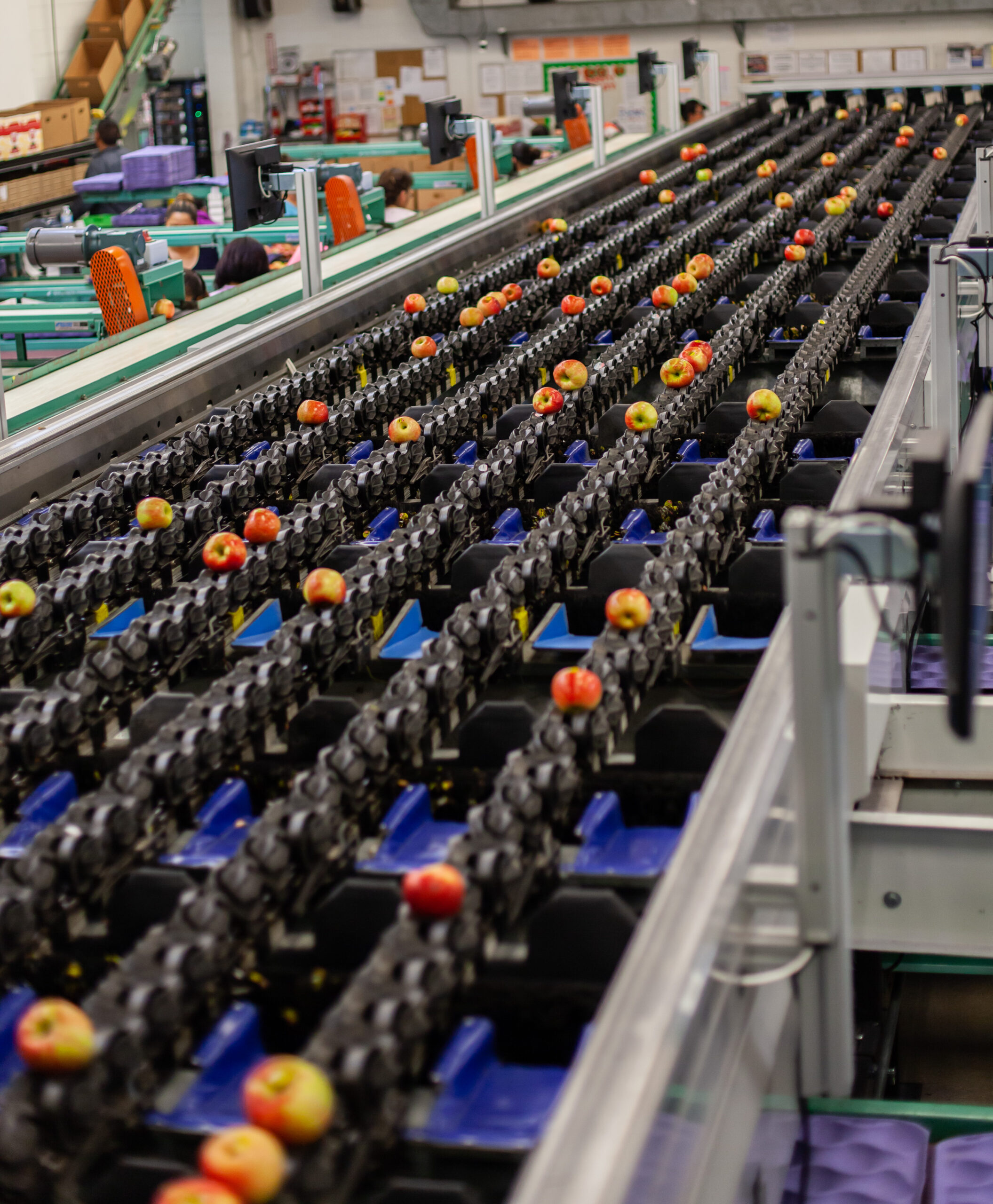When COVID-19 hit south-central Pennsylvania in mid-March, it became clear that daily operations at Rice Fruit Company needed to change immediately and drastically to adapt to their status as an essential business. As the vice president of sales and marketing, Brenda Briggs helped the more than 100-year-old family-run business act quickly to keep employees safe and to maintain apple distribution to grocers and food banks without disruption. Briggs is also a USApple board member and recently shared how Rice Fruit Company has responded to the pandemic.
“Immediately, we went into a mode of sending home as many people as possible, just keeping key people in the packing house and office as necessary,” said Briggs. “We worked with employees to ensure they knew we could keep them financially supported if they had to go home sick or care for family members.”
She notes that the organization’s response has been very nimble and has adapted over the last few months to ensure the most up-to-date guidance is followed. Staff members who could work from home were equipped to do so.
“We were buying lots of laptops and supplies to get people set up to work at home, and the team was able to get moving quickly,” Briggs explained. “We immediately shut down visitors. A few vendors who are essential call instead of visiting, and truck drivers have extra facilities they can use outside. No one is sharing forklifts.”
Inside the packing facilities, employees needed to keep a distance from each other without compromising operational efficiency.
“We were putting procedures in place to spread people out, adjusting packing schedules, and staggering breaks and lunches,” said Briggs. Last year, Rice Fruit Company invested in robots to stack pallets. It had become increasingly difficult to hire people to do that job and having that technology in place now has been perfect timing. Spreading out employee schedules helped ensure that Rice Fruit Company could keep up with increasing demand from retail partners.
“Our retail business blew up. The first few weeks were very hectic,” explained Briggs. Between new safety procedures and impacts on operational processes, there was very little time for a learning curve, and the staff rose to the occasion.
Early on, Rice Fruit Company hired a bilingual COVID-19 response safety officer. This person was designated to conduct daily health checks with each team member upon arrival to work and continues to do so. Each employee’s temperature is checked from a distance. The safety officer ensures that team members and their close contacts at home have not been experiencing any symptoms. Employees are encouraged to be extra cautious and avoid coming in to work if they feel sick, or if someone they live with is not feeling well.
While at work, whether in the office or on the packing line, all employees follow strict protocols, including wearing a face mask, regular handwashing, and maintaining six feet of distance from others. Rice Fruit Company also installed helpful tools and reminders to improve adherence to safety procedures, including additional handwashing stations and touchless 20-second countdown clocks.
“We have changed everything we do by watching the flow of employees. We try to reduce areas where people congregate, like breaks and lunches. We have cubicles in the lunchroom, and we have encouraged people to eat outside or in their cars to stay in compliance,” said Briggs.
Rice Fruit Company has focused on four key pillars of safety as new evidence and guidance have emerged. These pillars include employee health and accountability with health checks, providing masks and requiring that they be worn at all times, ensuring employees maintain six feet of distance from each other, and regular handwashing.
“When practiced together, it makes a difference,” said Briggs. “We initially hired our COVID response safety officer to focus on employee health screening, but that person circulates throughout the day to ensure other policies are followed, and offers gentle reminders when people are too close together.”
Despite the massive changes in daily routines, it can be challenging to break the natural habit of engaging with coworkers.
“This has been such a disruption to every part of our lives as human beings. We have natural tendencies to get too close, and it’s helpful to have reminders to keep each other accountable and caring for each other.”
In addition to the new policies adopted to promote employee health and safety, Briggs describes additional operational changes as “a million little a-ha moments” that may have long-term impacts on internal processes.
With fewer people working on the packing lines at the same time, Rice Fruit Company has tested different ways of running the lines, and even discovered efficiencies they will likely carry forward into future operations post-COVID-19. Typically, they run pack-to-order, with shorter runs and more frequent changes in apple varieties. With fewer people and more distance between them, the line runes slower. The team discovered it was more efficient to do a longer run of a single variety for a few days’ supply.
“That simple change made us more efficient and able to continue meeting customer needs,” Briggs shared.
The team has taken these changes in strides, and management has used the fluid situation to gather more regular feedback from employees—through a wider variety of channels.
“Senior management and the sales team do much better at communicating and doing it in different ways—not just sitting around a table at a formal meeting,” explained Briggs.
The information center keeps the entire team up to date on every policy in place, if changes are happening, and gathering feedback. Managers in each department have also increased their conversations with employees to gather more feedback informally, which helps solve problems faster.
For example, when fewer people were interested in working evening hours, managers discovered that if shifts started an hour earlier, they would be more desirable to team members who needed to get home to their families. The early morning sign-up was created to accommodate the lack of child care options so many of their employees have experienced. Once the adjustment was made, it was easier to fill out robust retail orders.
“In the first few weeks, especially as you’re going through the shock of all these shutdowns, we were part of an effort to provide a healthy product, and to keep grocery stores supplied while people were nervous about the food supply,” said Briggs.
By showing up to work each day (whether at the company’s facilities or home), the Rice Fruit Company team has continued to meet demand while keeping its team safe.








